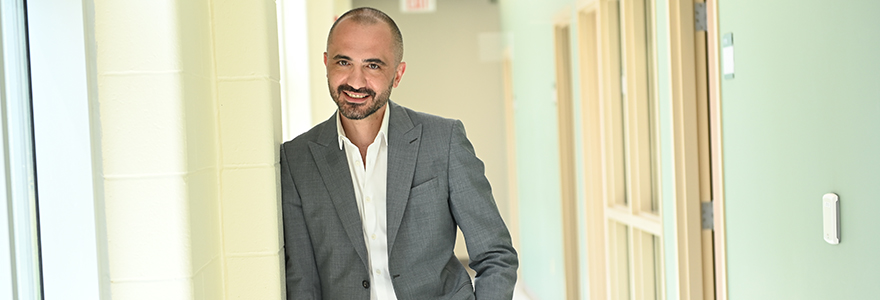Bringing Two Worlds Together
 The road to becoming a clinician-scientist was long and winding, but Dr. Armen Parsyan never gave up. Now in his first year at Schulich Medicine & Dentistry, he is making major strides in translating breast cancer research into practice
The road to becoming a clinician-scientist was long and winding, but Dr. Armen Parsyan never gave up. Now in his first year at Schulich Medicine & Dentistry, he is making major strides in translating breast cancer research into practice
By Ashley Rabinovitch
Dr. Armen Parsyan has always harboured a clear vision for his future. He graduated from medical school and general surgery residency in his native Armenia with his sights set on building a career that combines scientific research with surgical practice.
“I discovered a visionary group of scientists and physicians who genuinely supported me. I can’t say which project I’m most excited about right now. That would be like choosing a favourite child.”
— Dr. Armen Parsyan
“Seeing a patient cured gives me an enormous amount of purpose,” he shared. “But, we still see far too many patients succumb to disease despite our best efforts as clinicians. I realized that the best way to confront this challenge was to really understand the science behind disease and treatment strategies. I have an innate drive to combine my passions for surgery and science wherever I go.”
Eager to build his credentials in basic and clinical research after finishing medical school, Dr. Parsyan received training at some of the world’s most prominent academic institutions. He spent several years at Boston University and Harvard University before earning a PhD at the University of Cambridge.
While in the UK, he applied to surgical residency programs in Canada. “As a graduate of a medical school outside Canada, I never expected an acceptance letter,” he admitted. “I applied so that one day, I could tell my grandchildren that I tried.” To his surprise, he landed a coveted residency at McGill University. “It was a major step toward becoming a clinician-scientist,” he added.
In Montreal, Dr. Parsyan began to carve out a niche in breast cancer research. “I was attracted to breast cancer research partly because of how quickly the field is evolving,” he explained. “We may soon reach the point of tailoring therapies to individual patients with precision medicine.”
After serving as the chief editor of a 700-page tome that reviews the fundamental mechanisms of cancer and treatment strategies, Dr. Parsyan moved on to the University of Toronto to complete a surgical oncology fellowship and continue researching breast cancer. “At times, I thought about setting aside my passion for research,” he admits. “It was becoming increasingly difficult to find a stable position in Canada that combined the clinical and research components. It felt almost impossible, actually.”
Just when he had resigned himself to searching for work outside of Canada, Dr. Parsyan heard about an open position for a clinician-researcher at Schulich Medicine & Dentistry.
“I discovered a visionary group of scientists and physicians who genuinely supported me,” he affirmed. Since he joined the faculty in November 2019, Dr. Parsyan has continued to treat patients while building his research lab and securing grant funding. “I can’t say which project I’m most excited about right now,” he said. “That would be like choosing a favourite child.”
Currently, Dr. Parsyan is focusing his research on developing clinically-relevant experimental systems for studying individual patient responses to breast cancer treatments. One of these systems involves growing patient-derived tissues, also called patient-derived organoids (PDOs). “We’re in the process of validating this technology before applying it in a clinical setting,” he shared.
He is currently preparing a paper that examines the effectiveness of new chemotherapies, radiotherapies and combinations of the two in treating breast cancer using patient-derived preclinical systems.
Throughout the years, Dr. Parsyan has received prestigious awards and grants and published significant discoveries in high-impact scientific journals. He has already contributed a wealth of knowledge to basic and clinical research, and he is only getting started.
Despite his remarkable achievements, however, he expresses gratitude for the “lucky breaks” that allowed him to fulfill the elusive dream of becoming a clinician-scientist; free to occupy both worlds. “I’m chasing my passion,” he affirmed. “My life has taught me that the impossible can become possible. With enough perseverance, focus and compassion toward people who are suffering, we will defeat cancer one day.”








